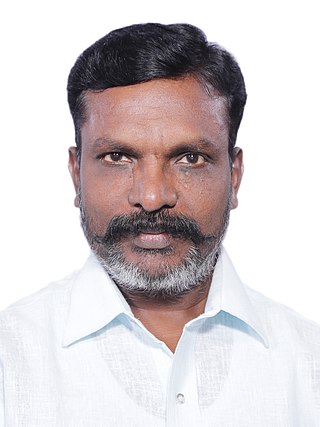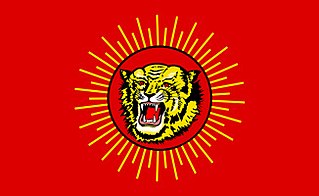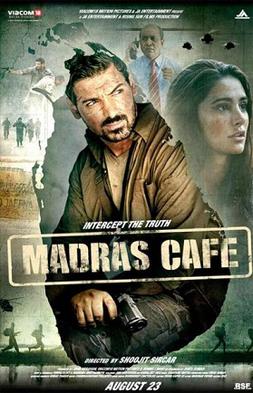Related Research Articles

The Liberation Tigers of Tamil Eelam was a Tamil militant organization, that was based in the northern and eastern Sri Lanka. The LTTE fought to create an independent Tamil state called Tamil Eelam in the northeast of the island in response to violent persecution and discriminatory policies against Sri Lankan Tamils by the Sinhalese-dominated Sri Lankan Government.

Rameswaram is a municipality in the Ramanathapuram district of the Indian state of Tamil Nadu. It is on Pamban Island separated from mainland India by the Pamban channel and is about 40 kilometres (25 mi) from Mannar Island, Sri Lanka. It is in the Gulf of Mannar, at the tip of the Indian peninsula. Pamban Island, also known as Rameswaram Island, is connected to mainland India by the Pamban Bridge. Rameswaram is the terminus of the railway line from Chennai and Madurai. Together with Varanasi, it is considered to be one of the holiest places in India to Hindus and is part of the Char Dham pilgrimage.

Viduthalai Chiruthaigal Katchi, formerly known as the Dalit Panthers of India or the Dalit Panthers Iyyakkam, is an Indian social movement and political party that seeks to combat caste based discrimination, active in the state of Tamil Nadu. The party also has a strong emphasis on Tamil nationalism. Its chairman is Thol. Thirumavalavan, a lawyer from Chennai, and its general secretary is the writer Ravikumar.

Tamil Eelam is a proposed independent state that many Tamils in Sri Lanka and the Eelam Tamil diaspora aspire to create in the north and east of Sri Lanka. Large sections of the North-East were under de facto control of the Liberation Tigers of Tamil Eelam (LTTE) for most of the 1990s–2000s during the Sri Lankan Civil War. Tamil Eelam, although encompassing the traditional homelands of Eelam Tamils, does not have official status or recognition by world states. The name is derived from the ancient Tamil name for Sri Lanka, Eelam.
The Anuradhapura massacre occurred in Sri Lanka in 1985 and was carried out by the Liberation Tigers of Tamil Eelam. This was the largest massacre of Sinhalese civilians by the LTTE to date; it was also the first major operation carried out by the LTTE outside a Tamil majority area. Initially, EROS claimed responsibility for the massacre, but it later retracted the statement, and joined the PLOTE in denouncing the incident. The groups later accused the LTTE for the attack. Since then, no Tamil militant group has admitted to committing the massacre. However, state intelligence discovered that the operation was ordered by the LTTE's leader Velupillai Prabhakaran. He assigned the massacre to the LTTE Mannar commander Victor and it was executed by Victor's subordinate Anthony Kaththiar. The LTTE claimed the attack was in revenge of the 1985 Valvettiturai massacre, where the Sri Lanka Army killed 70 Tamil civilians in Prabhakaran's hometown. In 1988, the LTTE claimed that the massacre was planned and executed under the guidance of Indian intelligence agency, RAW.

Tholkappiyan Thirumavalavan, better known as Thol. Thirumavalavan is a political leader, scholar and activist from the southern Indian state of Tamil Nadu. He is a Member of Parliament from Chidambaram. Leader and President of Viduthalai Chiruthaigal Katchi. He rose to prominence in the 1990s as a bahujan leader, and formally entered politics in 1999. His political platform centres on ending caste-based discrimination and consequently the caste system. He has also expressed support for Tamil nationalist movements in Sri Lanka.

Senthamizhan Seeman is an Indian film director, actor and politician. He is the leader and chief-coordinator of the Naam Tamilar Katchi political party in Tamil Nadu. He is a strong advocate for regional autonomy and Tamil nationalism by focusing on the Tamil language, identity, and culture.

Tamil nationalism is the ideology which asserts that the Tamil people constitute a nation and promotes the cultural unity of Tamil people. Tamil nationalism is primarily a secular nationalism, that focus on language and homeland. It expresses itself in the form of linguistic purism, linguistic nationalism, Social equality and Tamil Renaissance.

India–Sri Lanka relations, Indian-Sri Lankan relations, or Indo-Sri Lanka relations, are the bilateral relations between India and Sri Lanka. India has emerged as the foremost partner for Sri Lanka in the endeavor to revitalize its economy, reform its bureaucracy, and enhance decision-making processes for future economic collaborations. India and Sri Lanka share a maritime border. India is the only neighbour of Sri Lanka, separated by the Palk Strait; both states occupy a strategic position in South Asia and have sought to build a common security umbrella in the Indian Ocean. Both India and Sri Lanka are republics that are members of the Commonwealth of Nations.
Kumar Muthukumar was an Indian journalist and activist based in the state of Tamil Nadu, who came into prominence when he self-immolated protesting against the brutal atrocities against the Sri Lankan Tamil people at the peak of civil war in the country. His death instantly triggered widespread strikes, demonstrations and public unrest in the state, most notably the manifestation of popular defiance of the Government of India ban against the Liberation Tigers of Tamil Eelam, which the people demonstrated carrying flags of Tamil Eelam, placards and images of the LTTE leader V. Prabhakaran in the funeral procession of Muthukumar. Subsequently, 6 more Tamils committed self-immolation in various parts of the globe including India, Malaysia and Switzerland.
Between 2008 and 2009, major protests against the Sri Lankan civil war took place in several countries around the world, urging national and world leaders and organisations to take action on bringing a unanimous cease fire to the Sri Lankan Civil War, which had taken place for twenty-six years. Tamil diaspora populations around the world expressed concerns regarding the conduct of the civil war in the island nation of Sri Lanka. The civil war, which took place between the Sri Lankan Army and the separatist group Liberation Tigers of Tamil Eelam is believed to have killed over 100,000 civilians. Protesters and critics of the Sri Lankan government that triggered a culturally based civil war to be a systematic genocide and ethnic cleansing of the Sri Lankan Tamil minority in Sri Lanka.

Jegath Gaspar Raj ( Gaspar Raj Maria Paulian ) is a Chennai-based Catholic priest. He is the founder of the Tamil Maiyam organisation and co creator of the Chennai Sangamam festival. During 1995–2001 he served as the director of the Tamil service for Radio Veritas. He is also the organiser of the Idea-GiveLife Chennai International Marathon. He is also the founder of the Naller publications, a book publishing company. In 2009, during the final stages of Eelam War IV, he functioned as an intermediary between the Liberation Tigers of Tamil Eelam and the Government of Tamil Nadu.
Sri Lankan Tamils in India mainly refer to Tamil people of Sri Lankan origin in India and non-resident Sri Lankan Tamil. They are partly who migrated to India and their descendants and mostly refugees from Sri Lanka because of the concluded Sri Lankan Civil War. In general socio economically they are living below poverty line, except few people who settled in India during early times, rich businessmen, and professionals. In Tamil Nadu they are also known as Ceylon Tamils or Jaffna Tamils.
Sri Lankans in India mainly refer to Tamil people of Sri Lankan origin in India and non resident Sri Lankans. They are partly who migrated to India and their descendants and mostly refugees from Sri Lanka because of the recently concluded Sri Lankan Civil War. There is also a small population of Sinhalese people in India, numbering about 3,500 and mostly located in Delhi and Chennai. 57 Sri Lankans have become Indian citizens through naturalization since 2017. According to records with the Union Ministry of Home Affairs, as on January 1,2021, there were 58,843 Sri Lankan refugees staying in 108 refugee camps in Tamil Nadu and 54 in Odisha.

The Transnational Government of Tamil Eelam (TGTE) is a transnational organisation among the Sri Lankan Tamil diaspora which aims to establish Tamil Eelam, a secular and democratic socialist state which many Tamils aimed to create in the North-East of Sri Lanka.
The Tamil Eelam Supporters Organization (TESO) was an Eelam Tamil supporters organisation founded in 1985 with Dr. Kalaignar Karunanidhi as president and K. Veeramani and Nedumaran as members for the establishment of an independent Tamil Eelam in the northeast of Sri Lanka.

Naam Tamilar Katchi is a Tamil nationalist political party active in the Indian state of Tamil Nadu and the union territory of Puducherry. It is led by former Tamil actor and film director Seeman. The party is noted for its ideology of Tamil Nationalism. It primarily aims for the creation of a vote bank among Tamils.

Madras Cafe is a 2013 Indian Hindi-language political action thriller film directed by Shoojit Sircar and starring John Abraham, Nargis Fakhri with Raashi Khanna in lead roles. The film is set in the late 1980s and early 1990s, during the time of Indian intervention in the Sri Lankan civil war and assassination of Indian prime minister Rajiv Gandhi. The film deals with an Indian Army special officer who is appointed by the intelligence agency R&AW to head covert operations in Jaffna shortly after Indian peace-keeping force was forced to withdraw.

The 2013 anti-Sri Lanka protests were a series of student protests led by Tamil protesters and activists in Tamil Nadu, India in retaliation for war crimes committed against the Sri Lankan Tamil people by the Sri Lankan Army during the final stages of the Sri Lankan Civil War in 2009.
Contributions to popular culture involving direct reference to the Sri Lankan Tamil community in Indian cinema are listed below. All communities that speak Tamil and originally came from Sri Lanka are included. Tamils of Sri Lanka today are a trans-national minority and are found across the globe. While most films on the topic are made in Tamil cinema, there has also been Malayalam and Hindi content on the area.
References
- ↑ "Travel advisory against Tamil Nadu?" . Retrieved 28 January 2023.
- ↑ "Lanka may pull out of Tamil Nadu | The Sundaytimes Sri Lanka" . Retrieved 28 January 2023.
- ↑ "Lankan students turned out/refused lodgings in TN". The Sundaytimes Sri Lanka. Retrieved 28 January 2023.
- ↑ "Director of Prabhakaran threatens hunger strike". 28 March 2008. Retrieved 28 January 2023.
- ↑ "Attack aimed at sabotaging India-Sri Lanka relations". The Hindu. 25 January 2011.
- ↑ Sri Lankan President's kin attacked in Tamil Nadu The Indian Archived 4 March 2016 at the Wayback Machine
- ↑ "Under attack, Sri Lankan pilgrims flee Tamil Nadu". archive.ph. Archived from the original on 11 April 2013. Retrieved 28 January 2023.
- ↑ Attacks on Lankan pilgrims in Tamil Nadu: India assures security
- ↑ Attack on Bank of Ceylon Branch in Chennai Archived 15 February 2013 at the Wayback Machine
- ↑ "Mihin-Air office in Madurai attacked". Archived from the original on 24 March 2013. Retrieved 28 January 2023.
- ↑ "Mihin Lanka Madurai and Colombo connectivity from Madurai Airport". archive.ph. Archived from the original on 11 April 2013. Retrieved 28 January 2023.
- ↑ "Daily Mirror – Sri Lanka Latest Breaking News and Headlines". dailymirror.lk. Retrieved 28 January 2023.
- ↑ On way to airport, Sri Lankan pilgrims attacked by mob in Tamil Nadu
- ↑ "archive.ph". archive.ph. Archived from the original on 11 April 2013. Retrieved 28 January 2023.
- ↑ "Travel Advisory – Tamil Nadu". Archived from the original on 3 March 2014. Retrieved 1 April 2013.
- ↑ "Tamil Nadu travel advisory lifted". Archived from the original on 16 November 2012. Retrieved 28 January 2023.
- ↑ GOSL statement on incidents of assault and intimidation of Sri Lankan nationals in Tamil Nadu Archived 29 March 2013 at the Wayback Machine
- ↑ Statement on recent incidents involving Sri Lankans in Tamil Nadu
- ↑ "Travel advice on Tamil Nadu". 19 March 2013. Retrieved 28 January 2023.